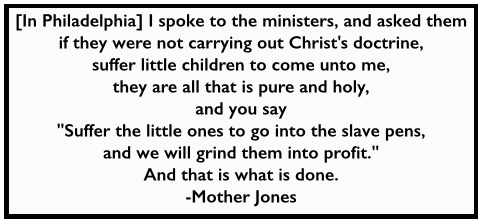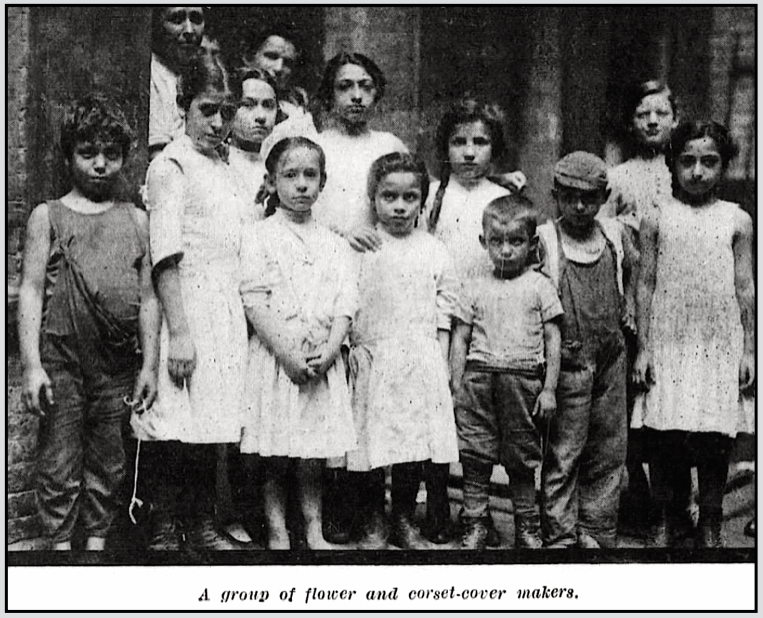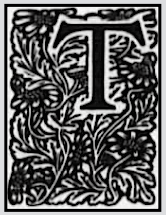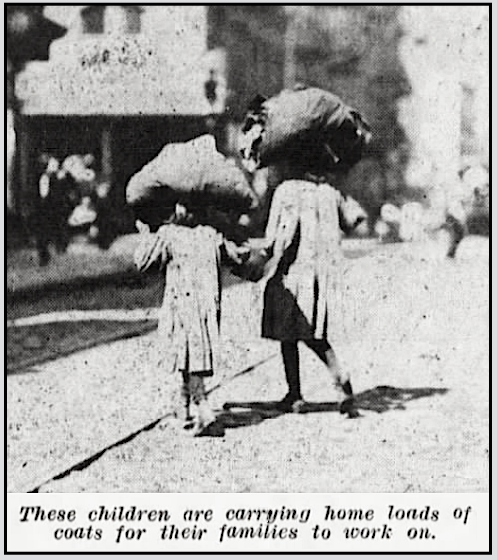 —————
—————
Hellraisers Journal – Thursday June 8, 1911
The National Consumers’ League Stands with Working Women and Children
From The Coming Nation of June 3, 1911:
How Women Help Women
By Grace Potter
[Part I of II.]
HE National Consumers’ League believes that the six million wage-working women in the United States are in many ways earning their bread under greater difficulties than the men wage slaves endure.
The shirt waist strike two years ago and the present strike of the box makers in New York illustrate one of the handicaps women suffer. Whatever move they made in the progress of their battle, the shirt-waist strikers were hauled into police court. They were often treated brutally by policemen, they were thrust into cells, they were fined, they were imprisoned. They suffered as no men strikers ever have in New York. The police were not deterred from unjust action against these young women by the thought of the way they might vote at the next election, because women have no vote.
Woman’s inferior physical strength, her maternal cares, her need to give attention to her home the while she is a wage earner, all are handicaps, too.
The National Consumers’ League is trying to make conditions better for working women because she is so handicapped. Incidentally they are making conditions better for men in many places.
It was over twenty years ago that the Consumers’ League was started in New York City. It has spread to many states and many countries since then and it is still spreading. It has two definite aims:
1. To abolish the sweating system.
2. To extend among all mercantile establishments commendable conditions.These are the means taken to accomplish such ends:
1. The Consumers’ League Label.
2. The White List of Fair Houses.
Started when the boycott and the blacklist were in the lusty power of their youth, the Consumers’ League passed them both by in their choice of weapons.
[They said:]
We will put our label upon goods made under right conditions. We will ask all members of the league and friends of labor to look for this label when they buy.
Thus was the Consumers’ League Label born.
[They said:]
We will make a list of all retail stores where things are sold under proper selling conditions. We will ask all our members to do their buying at stores on this list and we will ask all friends of labor to do the same.
Thus was the White List born.
Society people, men and women, professional people and wage workers belong to The Consumers’ League. Among the officers of the league are found the presidents of Yale, Wellesley, Mount Holyoke and Vassar, professors from Harvard, Columbia, Cornell, Chicago, Michigan, Wisconsin, Oberlin and California.
Did you ever hear of a report from an investigating committee of any philanthropic society being used by a current magazine as a paid article? No? Well that is just what has happened to a report in this society. Or, rather, the report has been run as a series of articles. Sue Ainslee Clark and Edith Wyatt, investigating conditions for The Consumers’ League, wrote their report giving literal personal stories of the way working girls live. McClure’s published the report in six different issues, paying well for its use.
The general secretary of the League is Mrs. Florence Kelley, the well-known writer and lecturer. In the interest of the League she has addressed 133 meetings in the last year. These included between July 18th and July 23d, eleven meetings in Portland, Ore. The variety of the audiences to whom the League appeals may be gauged by the fact that the Portland meetings included lectures in churches of all denominations, society women’s homes, prominent club houses, and wound up with a meeting in the Oregon Chamber of Commerce.
Sixty-five manufacturers in this country are now using the Consumers’ League Label. Thousands, yes, hundreds of thousands of men and women all over the United States ask to see this label before they purchase dry-goods.
These are the conditions that the League demands before it grants the right to the use of its label. It must be assured that goods are made in factories in which the state factory law is obeyed, work is not done at night, children under sixteen are not employed, and no goods are given out to be made up in homes.
A Fair House, which may be scheduled on The White List, is one in which equal pay is given for work of equal value, irrespective of sex, and in which no saleswoman who is eighteen years of age or over-and who has had one year’s experience as saleswoman-receives less than six dollars a week.
Wages must be paid by the week.
The minimum wages of cash children must be three and a half dollars a week.
The number of working hours must not exceed nine.
Three-quarters of an hour minimum for lunch.
One half-holiday each week during two summers months at least.
Vacation of not less than one week, with pay, during summer..
All overtime compensated for.
Wages paid and premises closed for the seven principal holidays, Thanksgiving, Christmas, New Year’s , Washington’s Birthday, Fourth of July, Decoration Day and Labor Day.
A Fair House is one that does not remain open more than four evenings during the time between December 15th and 25th, nor stay open these four evenings later than nine o’clock.
Work, lunch and retiring rooms are apart from each other and conform to present sanitary laws.
The law regarding the providing of seats for saleswomen must be observed, and the use of these seats permitted.
No children under fourteen may be employed.
No children under sixteen shall work more than nine hours a day.
While investigating the manufacture of muslin underwear, the League took special pains to inquire into the cost of sweated goods and fair goods. They found that where labor is treated right the selling price of the goods is not increased. Where they know enough to organize an industry well, and use the best machinery, the league says, they also know enough to treat their workers right. For instance, nightgowns which sell at thirty-nine cents, shirtwaists at fifty, as well as higher grades, are made in factories using the Consumers’ League Label. In fact, as a rule, it has been found that goods of moderate price are made under better conditions than the costliest articles on the market. The millionaire’s wife when she buys ready-made muslin lingerie is, therefore, more apt to get tuberculosis, scarlet fever, and the easily carried infectious diseases, than the woman who can spend less on her clothes.
This one factor should make every consumer interested in the producer, if nothing else would do so.
Beside lectures to tell of the bad conditions under which sweat-shops are conducted, the League has established an exhibit which, with an efficient student of social conditions in charge, is instructing hundreds of people every day. It is taken to any city where request is made for it. The exhibit is free. It aims to show bad working conditions in sweat-shops. It shows specimens of work with the price paid to the worker marked in plain letters on it. There are also specimens of food which, when obtained in the market, was either adulterated, spoiled or falsely labeled. There are shown wormy dried beans, imported from Italy; peas highly colored by chemicals; cotton-seed oil marked as pure olive oil.
A special feature of the exhibit is the section where conditions in the ready-made clothing trade are shown. One-third of all the ready-made clothing for men and boys of the whole United States is made in New York City and two-thirds of all the ready-made clothing for women and girls is made in the same place. This is one of the worst sweated industries in America. During the recent cloak-makers’ strike in Chicago the public had an insight into what these wage slaves suffer.
Much of the ready-made clothes are half done in shops and taken to tenements to be finished. While home-work with unending hours (whole families working from early morning to late at night) is bad for the producer it is bad also for the consumer. The worker underfed, living in the unsanitary tenement house, gets disease. It is carried in the clothing he makes to the consumer.
—————
[Emphasis added.]
~~~~~~~~~~~~~~~~~~~~
SOURCES & IMAGES
Mother Jones Quote, CIR May 14, 1915
https://play.google.com/books/reader?id=PeweAQAAMAAJ&printsec=frontcover&output=reader&hl=en&pg=GBS.PA10634
The Coming Nation
(Girard, Kansas)
-June 3, 1911
https://www.marxists.org/history/usa/pubs/coming-nation/110603-comingnation-w038.pdf
See also:
-re Grace Potter, see:
Club Women of New York, Volume 6, Parts 1910-1911
Mail and Express Company, 1910
(search: “grace potter”)
https://books.google.com/books?id=nTIBAAAAYAAJ
Tag: Grace Potter
https://weneverforget.org/tag/grace-potter/
National Consumers League
https://en.wikipedia.org/wiki/National_Consumers_League
Florence Kelley
https://en.wikipedia.org/wiki/Florence_Kelley
“Working-Girls Budgets”
-Series by Sue Ainslee Clark and Edith Wyatt, see:
McClure’s Magazine, Volume 35
S.S. McClure, 1910
https://books.google.com/books?id=dHQDAAAAMAAJ
-Oct 1910
https://play.google.com/books/reader?id=dHQDAAAAMAAJ&hl=en&pg=GBS.RA2-PA595
McClure’s Magazine, Volume 36
S. S. McClure, Limited, 1911
https://books.google.com/books?id=Nj8vgq0MTHwC
-Nov 1910
https://play.google.com/books/reader?id=Nj8vgq0MTHwC&hl=en&pg=GBS.PA70
-Dec 1910
https://play.google.com/books/reader?id=Nj8vgq0MTHwC&hl=en&pg=GBS.PA201
-Feb 1911
“Women Laundry Workers in New York”
by Clark and Wyatt
https://play.google.com/books/reader?id=Nj8vgq0MTHwC&hl=en&pg=GBS.PA401
-April 1911
“New York Cloak-Makers’ Strike” by Wyatt
https://play.google.com/books/reader?id=Nj8vgq0MTHwC&hl=en&pg=GBS.PA708
Making Both Ends Meet by Clark and Wyatt
Macmillan Company, 1911
http://reader.library.cornell.edu/docviewer/digital?id=hearth4282542#mode/2up
~~~~~~~~~~~~~~~~~~~~~~~~~~~~~~~~~~~~~~~~
Working Girl Blues – Barefoot Duo
Lyrics Hazel Dickens



